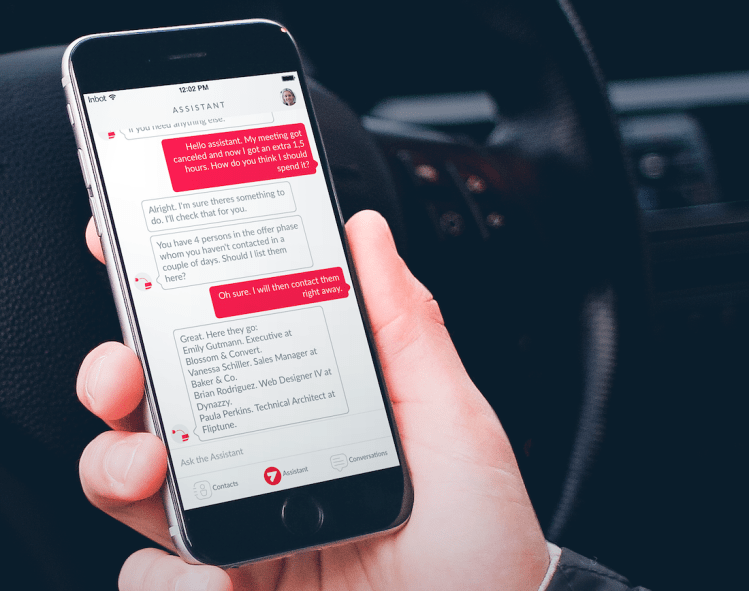One of the oldest software tools available to salespeople, a customer relationship management system is also one of the ripest targets for change.
Today, Berlin-based Inbot takes aim with the public release of its first product — an intelligent sales assistant.
The central idea, founder Mikko Alasaarela told me, is to avoid the administrative busywork and managerial bureaucracy of a CRM by means of an artificial intelligence-powered, communications-oriented helper.
“CRM has been for sales executives,” he said, echoing the sentiment of others. He noted that it requires a fifth of users’ time to enter administrative data, and added that attempts to create a mobile CRM simply “crunch it” into a smaller form factor.
He also cited reports of high rates of failure for meeting expectations. (The flipside, such as a recent report from Capterra, point to the 71 percent of CRM users who are satisfied or very satisfied.)
“Lots of money and a world of pain,” Alasaarela characterized the CRM space. “Sounds like a great opportunity for a startup.”
The solution, he said, is “a Slack for sales.” It’s not a smaller CRM, but a helper based on sales-related communications.
“Instead of a toolset,” he said, “we offer you a messaging system as a service.”
VB just released Marketing automation: How to make the right buying decision (the first time)
$299 on VB Insight, or free with your martech subscription
For smaller companies, the app is intended to serve sales reps’ key needs without the maintenance and implied hierarchy of a CRM. For larger companies, it’s a sales assistant.
But, at the moment, it’s largely a standalone assistant. While it’s integrated with calendars from Google and Microsoft and with leading contact managers, it’s not integrated with Salesforce or other CRMs, although Inbot says that’s being researched. If you want to get your Salesforce contacts into Inbot, you have to export a file and Inbot will import them for you.
Available for iOS, the app is oriented around three functions: contacts, conversations, and assistant.
Contacts can be imported from other contact managers, and they serve as the central framework for tracking your sales calls, deal status, and relationships. The app automatically orders contacts by relevance, based on your past conversations and its expectation of whom you will contact next.
A pending deal-in-progress, one of the key features of a CRM, resides with the associated contact. You can indicate the deal’s current status and potential dollar value on a simple timeline. Built-in messaging enables conversing with contacts or other team members.
You can ask your app questions, based on data inside. Alasaarela indicated the system is being trained by every inquiry, with machine learning making it more intelligent.
The fallback is a human
For questions that the system can’t answer, the fallback is an actual human assistant. Alasaarela said the company currently has three dedicated staff for that purpose. They get access to your calendar to do things like setting up a meeting or finding a flight that meets your needs.
For subscribers, there’s no limit on the amount of questions you can throw at a human. But there are some areas the humans won’t handle, Alasaarela said, like conducting market research.
Turnaround time for human responses could be several hours, he said, and takes place within a European workday.
The company reports that 91 percent of user engagement in the test period has employed AI, while only nine percent has required carbon-based lifeforms. It’s not clear how human assistants will scale if the user base becomes huge, but assumedly the AI will take an increasingly larger proportion of inquiries.
The app itself is free, as is an initial level that allows users to employ it as a contact manager or a messaging app for team members.
For $99/month, the app can be used as an assistant, with the AI capability and apparently no limit on how much time human assistants will give to you. Other pricing levels for different service configurations are still in the works.
There is no shortage of mobile tools to help salespeople. Some, like Kitedesk, want to combine a CRM, email, and social media, while others, like AppMesh’s SalesMesh, want to exist in parallel with Salesforce until the rep is ready to commit a deal to the big system.
To Inbot, which has raised over $3 million in seed funding thus far, many salespeople don’t need the extensive functions of a CRM system, like email campaigns, predictive lead scoring, or social media listening. For this new app, relating to the customer is about communications.
VentureBeat's mission is to be a digital town square for technical decision-makers to gain knowledge about transformative enterprise technology and transact. Learn More

